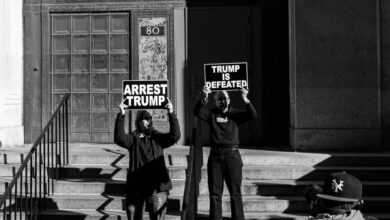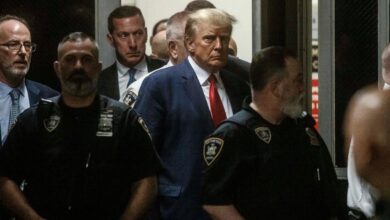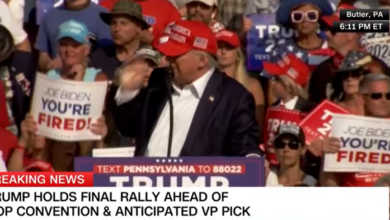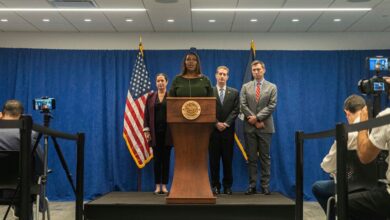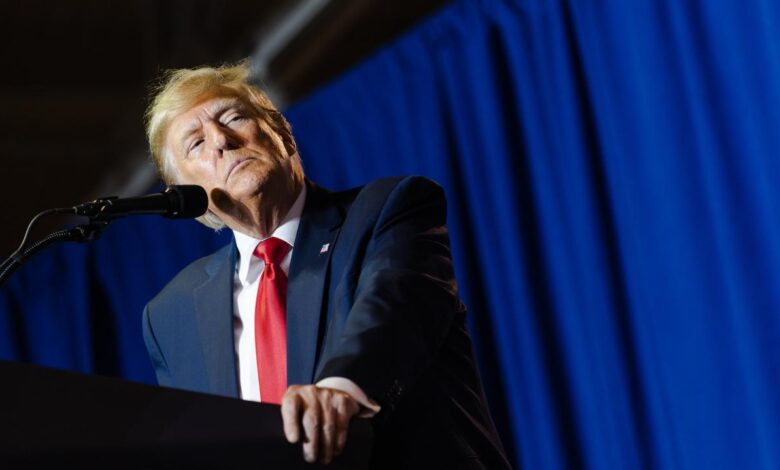
Trump to Skip Second Republican Debate
Trump to skip second Republican debate: It’s a move that has sent shockwaves through the Republican primary race, leaving political pundits and voters alike scratching their heads. With the second debate just around the corner, Trump’s decision to sit this one out is a bold move that has sparked intense debate and speculation.
Will this strategy ultimately benefit Trump, or could it backfire?
The reasons behind Trump’s decision are multifaceted, ranging from a desire to control the narrative to a calculated effort to avoid potentially damaging confrontations with his rivals. Some analysts believe that Trump is simply playing a calculated game, aiming to maximize his exposure through alternative media platforms and avoid the scrutiny of a live debate setting.
Others argue that Trump is simply not interested in engaging with his opponents, believing that his name recognition and base of support are strong enough to secure the nomination without participating in traditional campaign events.
Trump’s Decision to Skip the Debate
Donald Trump’s decision to skip the second Republican debate, hosted by Fox News in Simi Valley, California, on September 27, 2023, has sent shockwaves through the political landscape. This move, while not entirely unprecedented, has ignited a firestorm of speculation and debate, prompting questions about his campaign strategy, the Republican primary race, and the future of the GOP.
Reasons Behind Trump’s Decision
Trump’s decision to skip the debate was driven by a confluence of factors. His campaign has repeatedly criticized Fox News, accusing the network of bias against him. Trump’s team has argued that he has already established himself as the frontrunner in the Republican primary and that participating in a debate hosted by a network he views as hostile would be counterproductive.
Furthermore, Trump has suggested that he would rather engage directly with voters through alternative platforms, such as his own social media network, Truth Social.
Potential Implications of Trump’s Absence
Trump’s absence from the debate has several potential implications for the Republican primary race. It could potentially give other candidates a chance to shine and gain momentum. However, it could also backfire, as it could be perceived as a sign of weakness or a lack of confidence.
Trump’s absence might also further polarize the Republican party, potentially alienating moderate voters.
Reactions to Trump’s Decision
Other Republican candidates have reacted to Trump’s decision with a mixture of surprise, disappointment, and opportunism. Some have criticized his decision, calling it a sign of disrespect for the voters and the Republican party. Others have seized the opportunity to position themselves as the alternative to Trump, emphasizing their willingness to engage in debates and participate in the democratic process.
Political analysts have offered a range of interpretations, some arguing that Trump’s decision is a calculated move to avoid scrutiny and maintain his dominance, while others believe it could ultimately hurt his chances of winning the nomination.
Trump’s Approach to Debates in This Election Cycle
Trump’s decision to skip the second debate is consistent with his approach to debates in this election cycle. He has already opted out of the first Republican primary debate, hosted by CNN and the New Hampshire Union Leader, in August 2023.
This pattern suggests that Trump is prioritizing alternative forms of communication, such as rallies and social media, over traditional media platforms like television debates. His strategy is likely based on the belief that he can effectively reach his base through these alternative channels and that participating in debates might not be beneficial to his campaign.
The Debate’s Significance
The second Republican primary debate, despite Trump’s absence, held considerable significance. It provided a platform for other candidates to showcase their positions on key issues and differentiate themselves from their rivals. The debate was anticipated to delve into a wide range of topics, including the economy, healthcare, foreign policy, and social issues.
Impact on the Republican Primary Race
The debate offered a valuable opportunity for the remaining candidates to gain momentum and secure their place in the race. By effectively addressing the concerns of Republican voters and presenting compelling arguments, candidates could potentially attract new supporters and solidify their existing base.
Trump’s decision to skip the second Republican debate is a bold move, especially given the heated political climate. While he’s focusing on his own campaign strategy, President Biden has taken a different approach, signing an executive order to ramp up gun control.
It’ll be interesting to see how these contrasting strategies play out in the upcoming elections, particularly as the debate over gun control continues to be a central issue.
Conversely, a lackluster performance or controversial statements could damage a candidate’s standing and hinder their chances of securing the nomination.
The Debate’s Influence on Public Perception
The debate served as a critical platform for shaping public perception of the candidates. Voters were able to observe how each candidate handled pressure, responded to challenging questions, and articulated their vision for the future. The debate’s impact on public opinion could have influenced voter preferences, especially among undecided voters.
The Debate’s Role in Shaping the Narrative of the Republican Primary
The debate played a significant role in shaping the narrative of the Republican primary. By highlighting specific issues and emphasizing certain themes, the debate could have set the agenda for future discussions and influenced the direction of the campaign. The debate’s influence on the narrative could have been particularly important in defining the key issues and priorities for the Republican Party.
Trump’s decision to skip the second Republican debate is a bold move, and it’s interesting to consider it in light of a recent Gallup poll that found Americans view the government as the biggest problem facing the country today. Perhaps Trump sees this as an opportunity to further distance himself from the traditional political establishment, arguing that he’s the only candidate truly capable of fixing the problems that plague our nation.
Trump’s Campaign Strategy
Donald Trump’s campaign strategy is a unique blend of traditional and unconventional tactics, often characterized by his outspoken personality and disregard for political norms. His approach, particularly his decision to skip the second Republican debate, reflects a calculated effort to maximize his appeal to his core base while minimizing exposure to potential pitfalls.
Trump’s Overall Campaign Strategy, Trump to skip second republican debate
Trump’s strategy hinges on direct engagement with his supporters, often bypassing traditional media outlets and campaign events. He leverages social media platforms like Twitter to disseminate his message, bypassing filters and directly connecting with his audience. His rallies are designed to be highly theatrical, featuring fervent speeches and chants, creating an immersive experience for his supporters.
This approach, while unconventional, has been remarkably effective in mobilizing his base.
Reaching Voters Outside of Traditional Campaign Events
Trump’s campaign strategy is notable for its reliance on unconventional methods to reach voters. His extensive use of social media, particularly Twitter, allows him to bypass traditional media filters and directly engage with his supporters. His rallies are carefully orchestrated events, designed to evoke strong emotions and reinforce his message.
These events are often covered extensively by news outlets, providing him with free media exposure. Trump’s campaign also utilizes direct mail and email campaigns to reach voters, further bypassing traditional media.
Potential Risks and Benefits of Avoiding Debates
Trump’s decision to skip debates carries both potential risks and benefits. On the one hand, it allows him to avoid potentially damaging moments where he might be caught off guard or make gaffes. He can also control his message and avoid direct confrontation with his opponents.
However, skipping debates can be perceived as a sign of weakness or a lack of confidence. It can also limit his exposure to a wider audience and potentially alienate undecided voters.
Timeline of Trump’s Major Campaign Events and Decisions
- June 16, 2015:Trump announces his candidacy for President of the United States, launching his campaign with a fiery speech that quickly garnered national attention.
- July 16, 2015:Trump holds his first major campaign rally in Mobile, Alabama, attracting a large crowd and generating significant media coverage.
- August 6, 2015:Trump releases his first campaign ad, focusing on his business acumen and promise to “make America great again.”
- September 16, 2015:Trump participates in the first Republican debate, where he quickly emerges as a frontrunner and generates controversy with his aggressive rhetoric.
- October 28, 2015:Trump releases his first major policy proposal, focusing on immigration reform and border security.
- November 10, 2015:Trump holds a large rally in Phoenix, Arizona, where he delivers a speech on immigration and national security, drawing a large crowd and sparking protests.
- December 19, 2015:Trump participates in the second Republican debate, where he continues to dominate the stage with his assertive style and controversial statements.
- January 14, 2016:Trump wins the Iowa caucuses, a major victory in the early stages of the Republican primary.
- February 9, 2016:Trump wins the New Hampshire primary, solidifying his position as the frontrunner in the Republican race.
- February 20, 2016:Trump wins the South Carolina primary, further cementing his lead in the Republican primary.
- March 1, 2016:Trump wins the Super Tuesday primaries, a decisive victory that propels him closer to the Republican nomination.
- July 18, 2016:Trump officially accepts the Republican nomination for President of the United States at the Republican National Convention.
- August 25, 2016:Trump announces his running mate, Mike Pence, the Governor of Indiana.
Trump’s decision to skip the second Republican debate feels like a calculated move, especially with the recent tensions in the Black Sea. The news of a Russian fighter jet hitting an American drone has dominated headlines, and Trump might be using this international conflict to his advantage by focusing on foreign policy issues and avoiding internal party debates.
- September 26, 2016:Trump participates in the first presidential debate against Hillary Clinton, where he faces criticism for his performance.
- October 9, 2016:Trump participates in the second presidential debate against Hillary Clinton, where he continues to generate controversy with his statements.
- October 19, 2016:Trump participates in the third and final presidential debate against Hillary Clinton, where he delivers a more subdued performance.
- November 8, 2016:Trump is elected President of the United States, defeating Hillary Clinton in a stunning upset.
The Republican Primary Race: Trump To Skip Second Republican Debate
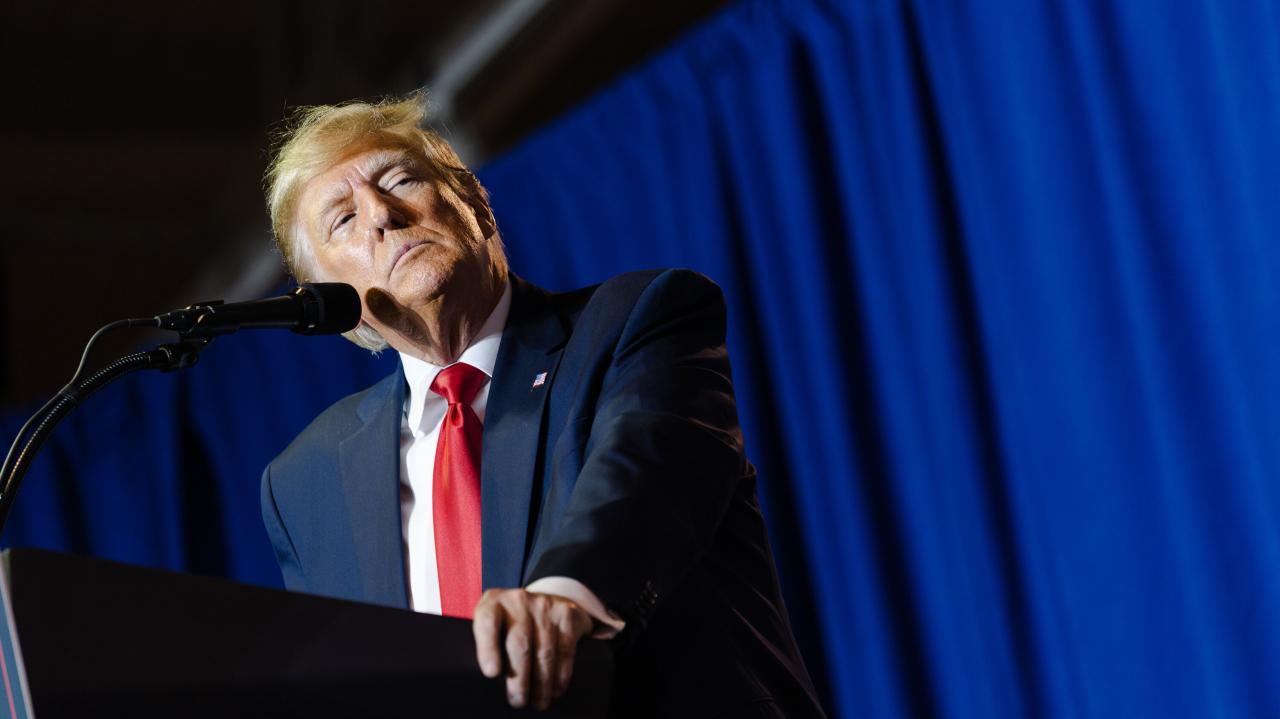
The Republican primary race for the 2024 presidential election is heating up, with a diverse field of candidates vying for the nomination. The absence of former President Donald Trump from the first debate has added another layer of intrigue to the contest, raising questions about the impact of his decision on the race’s dynamics and the ultimate outcome.
The State of the Republican Primary Race
The Republican primary race is currently characterized by a dynamic landscape, with several candidates vying for the nomination. While Trump’s absence from the first debate has sparked discussion about his strategy and the potential impact on the race, the other candidates have seized the opportunity to showcase their own positions and platforms.
Key Candidates and Platforms
Here is a table comparing the key positions and platforms of some of the major Republican candidates:
| Candidate | Key Positions | Platform |
|---|---|---|
| Donald Trump | America First, Immigration Restriction, Trade Protectionism, Tax Cuts, Deregulation | Focus on economic nationalism, American manufacturing, and national security. |
| Ron DeSantis | Conservative social values, Strong national defense, Limited government, Economic growth | Emphasis on fiscal responsibility, parental rights, and combating “woke” ideology. |
| Nikki Haley | Free markets, Strong national defense, Immigration reform, Education reform | Focus on fiscal conservatism, national security, and a new generation of leadership. |
| Mike Pence | Traditional conservative values, Strong national defense, Fiscal responsibility, Limited government | Emphasis on Christian faith, family values, and constitutional conservatism. |
| Tim Scott | Free markets, Opportunity for all, Limited government, Strong national defense | Focus on economic growth, individual liberty, and social mobility. |
Impact of Trump’s Absence
Trump’s decision to skip the first debate has had a mixed impact on the Republican primary race. Some argue that it has allowed other candidates to gain more visibility and solidify their positions, potentially weakening Trump’s hold on the base.
Others contend that Trump’s absence has only strengthened his position by allowing him to control the narrative outside the debate stage, where he can avoid direct attacks and potential gaffes.
Key Factors Influencing the Outcome
The Republican primary race is likely to be influenced by several key factors, including:
- Trump’s Role:The former president’s involvement in the race, both in terms of his own candidacy and his influence on the electorate, will be a major factor. His ability to mobilize his base and attract new voters will be crucial to his success.
- The Economy:The state of the economy will likely be a significant issue in the primary, with voters looking for candidates who can address their concerns about inflation, job security, and the cost of living.
- Conservative Voters:The Republican primary is largely driven by conservative voters, who are likely to prioritize issues such as abortion, gun rights, and immigration. Candidates who can effectively appeal to these voters will have an advantage.
- The Republican National Convention:The Republican National Convention will be a key moment in the primary, as it will formally nominate the party’s candidate for president. The outcome of the convention could significantly impact the race’s dynamics.
Public Opinion and the Debate
The decision of Donald Trump to skip the second Republican debate sparked significant discussions about the impact on public opinion. Many observers speculated that Trump’s absence could have both positive and negative consequences for his campaign. While some believed that skipping the debate would allow Trump to avoid potentially damaging confrontations, others predicted that his absence would be perceived as a sign of weakness or disengagement.
Public Opinion Polls and Surveys
Public opinion polls conducted before and after the debate revealed mixed reactions to Trump’s decision. For example, a poll conducted by ABC News/Washington Post found that 62% of Americans disapproved of Trump’s decision to skip the debate, while 38% approved.
However, a poll conducted by CNN found that 53% of Republicans approved of Trump’s decision, while 47% disapproved. These contrasting results suggest that public opinion on Trump’s decision was divided along partisan lines.
The Impact of Trump’s Decision on Public Opinion
Trump’s decision to skip the debate likely had a mixed impact on public opinion. Some voters may have viewed his absence as a sign of arrogance or a lack of respect for the democratic process. Others may have seen it as a shrewd strategic move that allowed him to avoid potentially damaging confrontations with his rivals.
Ultimately, the impact of Trump’s decision on public opinion is likely to be a matter of interpretation.
The Debate’s Potential Influence on Voters’ Perceptions
The debate itself could have significantly influenced voters’ perceptions of the candidates. The debate provided a platform for the candidates to showcase their policies, personalities, and debating skills. Voters who watched the debate may have been swayed by the candidates’ performances, particularly in areas such as policy positions, command of the issues, and ability to handle pressure.
The Debate’s Impact on the National Conversation
The debate likely had a significant impact on the national conversation about the Republican primary. The debate provided a platform for the candidates to address key issues facing the country, such as the economy, healthcare, and foreign policy. The debate also provided an opportunity for the candidates to engage in a public dialogue about their respective visions for the future of the Republican Party.
The debate’s impact on the national conversation is likely to be felt in the weeks and months to come.
Conclusion
Trump’s decision to skip the second Republican debate is a gamble, but one that could ultimately pay off. His strategy of bypassing traditional campaign events and leveraging alternative media platforms has proven effective in the past, and it remains to be seen whether this approach will continue to resonate with voters.
As the Republican primary race heats up, the impact of Trump’s decision on the dynamics of the race will be closely watched by political observers and voters alike.

